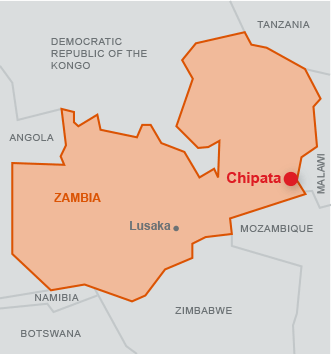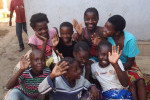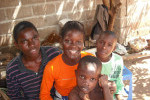
The project Smiling Kids Zambia uses an innovative and successful approach to integrate orphaned and vulnerable children (OVC) into society. Organised into six football teams children playfully practice social skills and improve their physical and mental health. Parallel to the sports program a theatre and music group was launched in 2008. The two programs motivate 150 children to regularly attend training which allows for a serious investigation of their situation and their needs. This creates the conditions for their enrolment into school and vocational training and for placement into foster care.
Facts and Figures
Smiling Kids Zambia
P.O. Box 510937
Chipata
Zambia
Phone: +(260) 216 223764
www.smilingkidszambia.org
2003
Jane Jere, Project Coordinator
Stephen Mawere, Senior Football Coach
- 150 orphaned and vulnerable children (OVC) and
- their families or foster families
- Local staff
- Children’s home / project centre
- Sharing of two governmental training grounds
- Equipment for six football teams and one drama group
- School books and blackboard for remedial teaching
- Two houses for renting out
- Office, porch roof for cooking, firewood saving stoves, water tank
- Solar system for bridging power outages
- Fulfilment of elementary needs such as meals, hygiene and health care
- Integration into the football teams and drama group
- 24-hour care for 15 OVCs at the children’s home
- Schooling and extra tuition for 150 children and young people
- Scholarships for vocational training
- Finding of foster families
CHF 79’400.– (2025)
Since 2004
Integration of orphaned and vulnerable children into school and into society
The Project
Background
Chipata is the Eastern Province capital of Zambia. Including outlying districts, the population of Chipata is over 200'000 people, but it does not give the impression of being a large city. There is hardly any industrial development; unemployment and poverty are the rule. Over half of Zambia’s population live below the poverty line and nearly half are undernourished. For the most part Chipata’s citizens lack socio-economic development potentialities and perspectives.
The high HIV infection rate and other endemic diseases are a huge strain on the society and the country’s economy. Many children become orphaned and find little support as their relatives’ households are already overloaded. Hence, many children are forced to make a living on the street accepting all kinds of odd-jobs and begging and stealing. Most of them are male, neglected, unqualified and in bad health.
The appearance of street children is a relatively new phenomenon in Chipata. In view of the social misery, it is supposed that the number of OVCs will remain high. There is still a definite need for action.
The project so far
Back in January 2003, Smiling Kids Zambia (SKZ) launched a pilot project for street children in Chipata. Based on this experience, the equal education fund (EEF) together with Smiling Kids Zambia initiated the present project concept in 2004. Since May of 2007 Ms Jane Jere is the project coordinator. Ms Jere is qualified teacher and before she became coordinator she has been in charge of the care and schooling of the children.
Smiling Kids Zambia works successfully because of a simple but powerful concept: the project encourages street children to play football. Football is what keeps the children off the street and motivates them to join the training four half-days per week. This constancy creates the opportunity to work seriously with the children and helps them with their integration into school and community.
120 children and young people attend football training four times a week. Every Saturday they play a match against another team from the regional football league. They are organised into six teams: one girls team, a U-12, U-15, U-17 and an amateur team as well as a team that plays in the “Division 1”-league where there is no age restriction. Our dedicated and competent staff promotes the children’s physical and mental development and organises their (re)schooling or vocational apprenticeship. Another twenty children regularly attend the project’s drama and music workshops. Together with the girls’ football team, the number of female beneficiaries has risen to 20 percent. In order to accommodate the orphans for whom no shelter could be found, a house in Chipata was purchased. Staff members take care of the kids around the clock, hence providing a place where they can be “children” again. A trained teacher organises private tutoring each weekday.
Success and challenges
The project tackles the complex problem of street children in an innovative way: Thanks to football and theatre, these children can be reintegrated into society. Smiling Kids Zambia proves that sport and development can be combined successfully and effectively. The children’s commitment to the football teams and theatre group allows us to work with them continually and meet each child’s individual needs.
Corruption is a problem in Chipata. It is one of the project’s strengths that we have carefully selected our staff since the beginning. This has proved to create a solid base to build on. Transparency and accountability are standard working practices for everybody on the project.
Cooperation with schools and other governmental agencies runs in a experienced manner. Since we support the only home in the entire district which can flexibly accommodate orphans, a close cooperation with the Zambian social welfare authority has developed. This authority places children they picked up on the street with Smiling Kids Zambia and helps to find suitable foster parents for these orphans. Since the start of the project, places for more than 300 children and adolescents could be found in families who were willing and able to accept the former street children and to take care of them. And 90 young people have been able to attend vocational training thanks to scholarships and support from Smiling Kids Zambia.
Goals
The overall goal of Smiling Kids Zambia is the reintegration of orphaned and vulnerable children into school and society. Thanks to the fascination of football and theatre the children are tempted away the streets and brought back to school. A children’s home accommodates fifteen orphans without any relatives that were willing to put them up. All children involved in the project get proper nutrition and medical care. After successful graduation, beneficiaries can start vocational training thanks to scholarships provided by Smiling Kids Zambia.
The project aims at improving the health and education of children. In addition, the orphaned and vulnerable children experience team spirit in football games or in performances in front of an audience, acquire social skills and receive recognition. As such they get to know other values and rules than the ones they know from the street.
The organisation and accounting of Smiling Kids Zambia has been improved continuously and has a high degree of professionalism today. This provides an important basis to work towards the goal of expanding the project’s own fundraising.
Support by the EEF
The support of the equal education fund (EEF) allows the children’s home to run and provides the infrastructure, equipment and training for six football teams and a theatre group. Our project supports all together 150 orphaned and vulnerable children and secures their (re)integration into school. The considerable initial funding by SDC – the Swiss Agency for Development and Cooperation – showed that our project has awoken an interest among experts.
The EEF regularly visits and evaluates the project. Though Smiling Kids Zambia has already achieved a lot, considerable personnel and material resources are needed to manage the constant challenges. An important part of our support focuses on building its capacity for local fundraising. The Zambian organisation should be able to increasingly self-finance their work with donations, contributions and their own capital. Thereby, decisive factors are the trust, respect and support of the local people and authorities. It is an important signal that Smiling Kids Zambia consistently receives donations from local donors.
Zambia
20,8 million inhabitants (estimate 2024)
752’614 km²
(eighteen times the area of Switzerland)
CHF 3’200.– (2023, adjusted for purchasing power)

Prices in Chipata (as of May 2024)
- 1 litre petrol:CHF 1.35
- 1 litre milk:CHF 1.05
- 1 litre Coca-Cola:CHF –.90
- 1 kilo bread:CHF 1.20
- 1 kilo rice:CHF 1.20
- 1 cinema ticket:CHF –.55 (Football match in a bar. There is no cinema)
- 1 pack cigarettes:CHF 1.70
- 1 bar of soap:CHF –.75
Sources:
Human Development Index (HDI), Food and Agriculture Organization of the United Nations (FAO), World Bank, CIA World Factbook, information from Jane Jere, own design and calculations.
Video
Project presentation
Gallery
_gallery_teaser.jpg?lm=1743671792)
Smiling Kids Zambia Picture Gallery 2024
view album
_gallery_teaser.jpg?lm=1723009617)
Smiling Kids Zambia Picture Gallery 2023
view album
_gallery_teaser.jpg?lm=1686898177)
Smiling Kids Zambia Picture Gallery 2022
view album
_gallery_teaser.jpg?lm=1650528115)
Smiling Kids Zambia Picture Gallery 2021
view album
_gallery_teaser.jpg?lm=1612795617)
Smiling Kids Zambia Picture Gallery 2020
view album
_gallery_teaser.jpg?lm=1584603570)
Smiling Kids Zambia Picture Gallery 2019
view album
_gallery_teaser.jpg?lm=1571959156)
Smiling Kids Zambia Picture Gallery 2018
view album
_gallery_teaser.jpg?lm=1571958845)
Smiling Kids Zambia Picture Gallery 2017
view album
_gallery_teaser.jpg?lm=1571958604)
Smiling Kids Zambia Picture Gallery 2016
view album

Smiling Kids Zambia Picture Gallery 2015
view album
_gallery_teaser.jpg?lm=1571957513)
Smiling Kids Zambia Picture Gallery 2014
view album
_gallery_teaser.jpg?lm=1571956977)
Smiling Kids Zambia Picture Gallery 2013
view album
_gallery_teaser.jpg?lm=1571956462)
Smiling Kids Zambia Picture Gallery 2012
view album
_gallery_teaser.jpg?lm=1571955746)
Smiling Kids Zambia Picture Gallery 2011
view album
_gallery_teaser.jpg?lm=1571955296)
Smiling Kids Zambia Picture Gallery 2010
view album

Smiling Kids Zambia Picture Gallery 2009
view album
_gallery_teaser.jpg?lm=1571954297)
Smiling Kids Zambia Picture Gallery 2008
view album
_gallery_teaser.jpg?lm=1571954088)
Smiling Kids Zambia Picture Gallery 2007
view album
_gallery_teaser.jpg?lm=1571953750)
Smiling Kids Zambia Picture Gallery 2006
view album
_gallery_teaser.jpg?lm=1571953599)
Smiling Kids Zambia Picture Gallery 2005
view album
_gallery_teaser.jpg?lm=1571953394)
Smiling Kids Zambia Picture Gallery 2004
view album

Smiling Kids Zambia Picture Gallery 2003
view album
